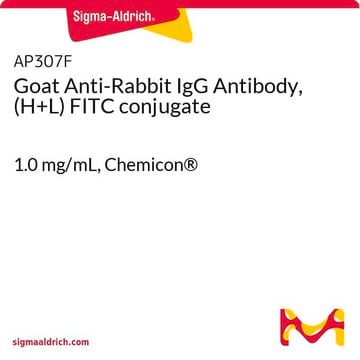AB5320A4
Anti-NG2, Alexa Fluor™488 Conjugate Antibody
from rabbit, ALEXA FLUOR™ 488
Synonym(s):
Chondroitin sulfate proteoglycan 4, Chondroitin sulfate proteoglycan NG2, Melanoma chondroitin sulfate proteoglycan, Melanoma-associated chondroitin sulfate proteoglycan
About This Item
Recommended Products
biological source
rabbit
Quality Level
conjugate
ALEXA FLUOR™ 488
antibody form
purified antibody
antibody product type
primary antibodies
clone
polyclonal
species reactivity
rat
species reactivity (predicted by homology)
monkey (based on 100% sequence homology), human (based on 100% sequence homology), mouse (based on 100% sequence homology)
technique(s)
immunocytochemistry: suitable
immunohistochemistry: suitable
NCBI accession no.
UniProt accession no.
shipped in
wet ice
target post-translational modification
unmodified
Gene Information
human ... CSPG4(1464)
mouse ... Cspg4(121021)
rat ... Cspg4(81651)
rhesus monkey ... Cspg4(713086)
General description
Specificity
Immunogen
Application
Neuroscience
Neurodegenerative Diseases
Quality
Immunocytochemistry Analysis: A 1:100 dilution of this antibody detected NG2 in rat oligodendrocyte precursor cells. Performed without Triton.
Target description
Physical form
Storage and Stability
Analysis Note
Rat or Human oligodendrocyte precursor cells
Legal Information
Disclaimer
Not finding the right product?
Try our Product Selector Tool.
Storage Class Code
10 - Combustible liquids
WGK
WGK 2
Flash Point(F)
Not applicable
Flash Point(C)
Not applicable
Certificates of Analysis (COA)
Search for Certificates of Analysis (COA) by entering the products Lot/Batch Number. Lot and Batch Numbers can be found on a product’s label following the words ‘Lot’ or ‘Batch’.
Already Own This Product?
Find documentation for the products that you have recently purchased in the Document Library.
Our team of scientists has experience in all areas of research including Life Science, Material Science, Chemical Synthesis, Chromatography, Analytical and many others.
Contact Technical Service







